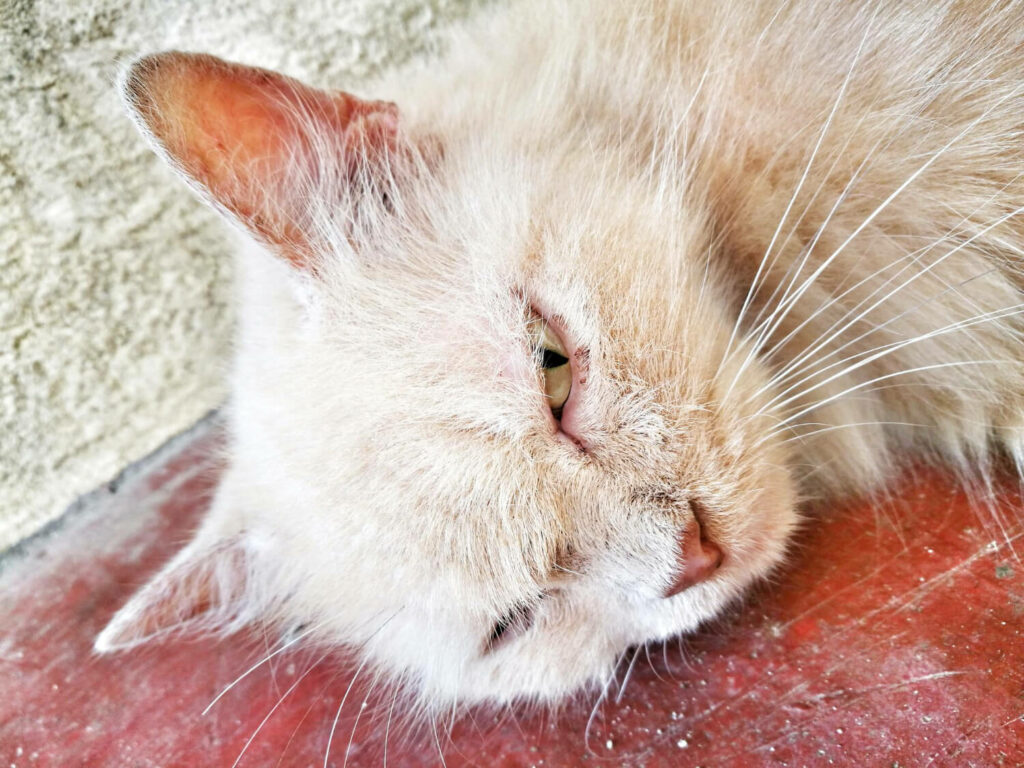3 Best and Affordable Ear Mite Medicine for Cats
Ear mites are a common culprit behind this discomfort for cats. These tiny parasites can wreak havoc on your kitty’s peace of mind, but the good news is they’re treatable!
With a bit of help from the ear mite medicine for cats your cat will be thriving in no time! But, its recommended to talk to your vet before giving your cat any medication, no matter if its ear mites drops or melatonin.
Stay with me till the end and you’ll discover the symptoms to watch for, how cat ear mites spread, and the different types of ear mite medication available.
I’ll also provide tips on how to administer ear drops or other treatments effectively (because let’s be honest, sometimes wrangling a cat for medication can be a challenge!).
Key Takeaways:
- Look out for signs such as frequent head shaking, scratching, dark discharge, redness, inflammation, loss of balance, or unpleasant odor coming from your cat’s ears.
- Ear mites are highly contagious among cats.
- Ear mite treatment for cats is generally affordable.
What are Ear Mites?
If you’ve ever noticed your pet shaking their head more than usual, or scratching their ears raw, then the culprit might be ear mites. Ear mites are tiny eight-legged arachnids that burrow into the ear canals of animals, causing irritation and discomfort.
While the thought of creepy crawlies living inside your furry friend’s ears might be unsettling, ear mites in cats are a common issue and treatable with the help of your veterinarian.
Ear mites are most prevalent in cats and dogs, but can also affect rabbits, ferrets, and even occasionally humans. The most common culprit is Otodectes cynotis, a species that feeds on earwax and skin debris.
These microscopic mites multiply quickly, leading to an itchy infestation that can be quite bothersome for your pet.
Are Ear Mites Contagious?
Ear mites are highly contagious among cats and can easily spread from one feline to another through direct contact. These tiny parasites thrive in the warm and moist environment of the ear canal, where they feed on skin oils and debris.

Cats that come into close contact with an infected animal, such as through grooming or sharing bedding, are at risk of contracting ear mites themselves. Additionally, ear mites can also be transmitted indirectly through contaminated objects like brushes, bedding, or furniture.
Therefore, if one cat in a household is diagnosed with ear mites, it’s essential to take precautions to prevent the spread to other pets.
Regular cleaning of bedding and grooming tools, along with isolating infected animals until they are treated, can help contain the spread of ear mites and protect the health of all pets in the household.
How to Know if a Cat has Ear Mites?
The first step is identifying ear mites in cats. Watch out for these signs:
- Frequent head shaking and ear scratching: This is a classic symptom, as the mites’ activity inside the ear canal irritates your cat.
- Dark, crumbly discharge in the ears: This discharge is a mixture of earwax, debris, and mite waste products.
- Redness and inflammation of the ear canal: You might notice your cat’s ear flap looking red and irritated.
- Loss of balance or tilting of the head: In severe cases, ear mite infestations can cause dizziness or balance issues.
- Strong, unpleasant odor coming from the ears: This odor is caused by the mites themselves and any secondary bacterial infections that might develop.
While the signs may seem clear, it’s essential to consult your veterinarian for a proper diagnosis. Ear mites in cats can mimic other ear problems, and a vet can accurately identify the culprit and recommend the most effective treatment plan.
They will also examine your cat for any potential secondary infections caused by scratching and irritation.

How to Treat Cat Ear Mites?
Once your veterinarian confirms ear mites in cats’ ears, they will prescribe medication to eliminate them. Here are some common treatment options:
- Ear drops: These medicated drops typically contain an insecticide that kills the mites and their eggs. Your vet will instruct you on the proper application technique and the frequency of treatment.
- Oral medication: In some cases, your vet might prescribe an oral medication, especially if there’s a high mite burden or if ear drops prove challenging to administer.
- Ear cleaning solution: Along with medication, your vet might recommend a gentle ear cleaning solution to remove debris and discharge that might hinder the medication’s effectiveness.
How much is Ear Mite Medicine for Cats?
Ear mite treatment for cats is fortunately quite affordable, allowing you to tackle the problem without breaking the bank. The price can vary depending on several factors:
- Medication Type: Ear drops are generally the most common and cost-effective option. Oral medication might be slightly more expensive.
- Brand: Brand-name medications might carry a higher price tag compared to generic alternatives that offer the same active ingredient.
- Dosage and Quantity: The amount of medication needed will depend on the severity of the infestation and your cat’s weight. A larger quantity of medication will naturally cost more.
- Retailer: Prices can fluctuate between online retailers, pet stores, and veterinary clinics.
Here’s a general breakdown of the expected costs:
- Over-the-counter ear drops: These can range from as low as $7 to $20 for a small bottle. I found on Amazon drops that start from $7 and go up to $94+. Amazon also offers ear-cleaning solutions and so many other things for cat health.
- Prescription ear drops or oral medication: Obtained from your veterinarian, these might cost between $15 and $50.
But medication isn’t the only expense to consider. Here are some additional potential costs:
- Veterinary consultation: The initial vet visit for diagnosis can range from $50 to $100, depending on your location and the clinic.
- Ear cleaning solution: A gentle ear cleaning solution recommended by your vet might cost around $10 to $20.
Ear Mite Medicine for Cats on Amazon
While I was researching ear mites medicine for cats I stumbled upon these medicines which had many great reviews on Amazon.
- PetArmor Ear Mite Treatment for Cats
- Zymox Otic Enzymatic Solution
- Vetnique Oticbliss Cat & Dog Ear Infection Treatment Drops
Home Remedies for Ear Mites in Cats
As we know, ear mites can be a pesky nuisance for our cats, causing discomfort and irritation. However, there are several effective home remedies to help alleviate this issue.
And while home remedies aren’t recommended, if you do not have the budget for a veterinary, you can try these home remedies;
One popular remedy involves using mineral oil or olive oil. Gently warm the oil and then use a dropper to apply a few drops into your cat’s ear canal.
Massage the base of the ear to help the oil penetrate and suffocate the mites. This remedy can be repeated every few days until the infestation clears up.

Another common household item that can help tackle ear mites in cats is apple cider vinegar. Mix equal parts of apple cider vinegar and water, then soak a cotton ball in the solution. Squeeze out any excess liquid and gently wipe the inside of your cat’s ears.
The acidic nature of the vinegar helps to disrupt the mites’ environment, making it less hospitable for them to thrive. Be cautious not to use this remedy if your cat has any open sores or scratches in their ears, as it may cause stinging.
While these home remedies can be effective in treating mild cases of ear mites in cats, it’s crucial to monitor your cat’s condition closely. If you notice any signs of worsening or if your cat’s symptoms persist despite home treatment, it’s best to consult with a veterinarian.
Why Home Remedies Aren’t the Best Choice for Ear Mites
While it’s tempting to seek out home remedies for your cat’s ear mites, it’s important to understand why they might not be the most effective or safest course of action. There are the drawbacks of home remedies:
- Limited Effectiveness: Many home remedies lack the potency of veterinary-approved medications to eradicate cat ear mites completely. Ear mites reproduce quickly, and incomplete treatment leaves room for the infestation to persist or worsen.
- Ineffectiveness Against Eggs: Most home remedies don’t target or kill mite eggs. Even if the adult mites are eliminated, the eggs will hatch, leading to a resurgence of the infestation.
- Potential for Irritation: Some home remedies, like essential oils or diluted vinegar solutions, can irritate your cat’s sensitive ears, causing further discomfort and inflammation.
- Masking Underlying Issues: Ear discharge can be a symptom of other ear problems besides mites. Using home remedies might mask a more serious underlying condition that requires veterinary attention.
Safer Alternatives for Your Cat’s Comfort
While home remedies aren’t recommended for treating ear mites in cats, here are some safe alternatives to soothe your cat’s discomfort while you seek veterinary help:
- Warm compress: A gentle warm compress applied to the outside of the ear can provide temporary relief from itching and inflammation.
- Cleaning with a soft cloth: If there’s visible discharge, you can gently wipe your cat’s ear flap with a soft, damp cloth moistened with warm water. Avoid using cotton swabs or inserting anything into your cats ear canal.
- Stress reduction: Ear mites can be stressful for your cat. Provide them with a quiet, comfortable space and familiar objects to help them relax.
These methods only offer temporary comfort and don’t address the root cause of the problem. Consulting your veterinarian for proper diagnosis and treatment is essential to ensure your cat’s long-term health and well-being.
FAQ
What are cat ear mites, and how do they affect cats?
Ear mites are tiny parasites that infest the ear canals of cats, causing irritation, itching, and discomfort. They feed on skin oils and debris, leading to symptoms such as frequent head shaking, scratching, dark discharge, redness, and inflammation of the ear canal.
Are ear mites contagious among cats?
Yes, ear mites are highly contagious among cats and can easily spread through direct contact or contaminated objects like bedding and grooming tools.
How can I tell if my cat has ear mites?
Common signs of ear mites in cats include frequent head shaking, scratching at the ears, dark discharge resembling coffee grounds, redness, inflammation, loss of balance, and a foul odor emanating from the ears.
What is the treatment for ear mites in cats?
Treatment typically involves the use of medicated ear drops containing insecticides to kill the mites and their eggs.
How much does ear mite medicine for cats cost?
Over-the-counter ear drops can range from $7 to $20, while prescription drops or oral medications obtained from your vet might cost between $15 and $50.
Can I use home remedies to treat cat ear mites?
While some home remedies like mineral or olive oil, and apple cider vinegar can provide temporary relief in mild cases, they are not recommended as a primary treatment.
Make sure to check out other BloggingWithConnie blogs and share to spread to word about those pesky ear mites. 🙂







